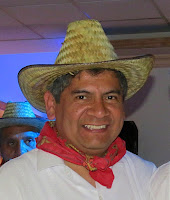If you follow me here at OMW or on Facebook, you know I’ve been volunteering to visit a delightful 108-year-old woman twice a week at her nursing home. She loves it when we head outdoors to the gardens and sit in front of the largest of three cascading waterfalls there.
She’s often characterized the sound of that tumbling water as musical, as having a voice. And that’s got me thinking.
How would you describe the sound of this kind of rushing water? Not a waterfall, where it does a free-fall and kind of explodes when it hits bottom; not a flume, where it’s fast, but more soft-spoken; but more of a steep, rocky rapids. That, my aquaphile friend and I have observed, is where this quicksilver element’s at its musical best.
What we heard is not a homogeneous sound,
not a solo, but a chorus of many voices.
What is it about that sound that we find so calming, so enchanting? So much so that nearly every “white noise machine” on the market features it as one of its tracks.
At this morning’s visit I did with the cascade’s voice what I so often suggest we all do with Nature’s small wonders: I experienced it as if for the very first time.
 What we heard this morning is not a homogeneous sound, not a solo, but a chorus of many voices. I tried to separate those parts and appreciate each for its unique contribution to the harmony.
What we heard this morning is not a homogeneous sound, not a solo, but a chorus of many voices. I tried to separate those parts and appreciate each for its unique contribution to the harmony.There aren’t even words—not in English anyway—for some of the sounds. But those our language can approximate with single words include:
Rush, gurgle, swish, splash, titter, slap—they’re all there. And when you think about those verbs you realize each connotes a very distinct sound. (In fact, most of these words are onomatopoeic; they sound like what they describe.)
What
do you think? Have I missed some intonations of water that you’ve
discerned? Do you have a favorite type and scale of water music? We’d
love
to hear from you.


They both listened silently to the water, which to them was not
just water, but the voice of life, the voice of Being, the voice of
perpetual Becoming. ~ HERMANN HESSE










